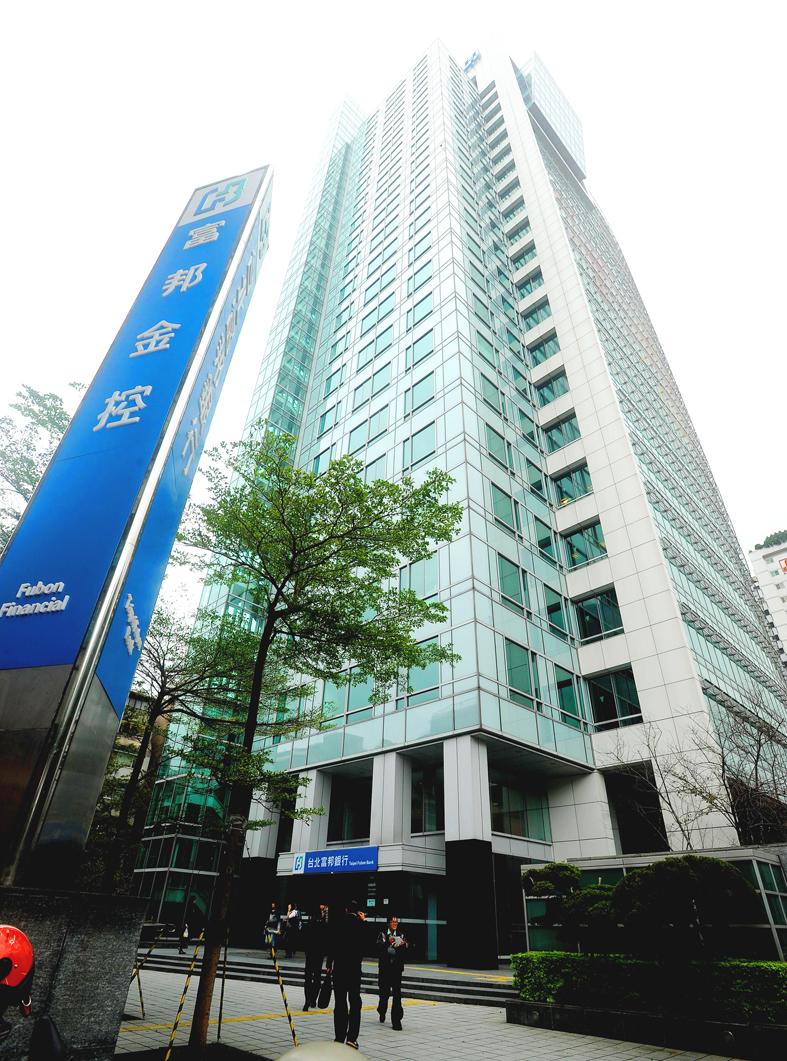The nation’s major financial conglomerates with life insurance subsidiaries have reported higher net profits for the first quarter of this year on the back of investment returns, buoyed by the booming domestic stock market, companies’ data showed.
Fubon Financial Holding Co (富邦金控), the nation’s second-largest financial holding firm by assets, yesterday reported net profit of NT$11.49 billion (US$403.7 million) for last month, up 42 percent year-on-year, while its net profit totaled NT$50 billion in the first quarter, up 118 percent year-on-year, it said in a statement.
Earnings per share were NT$4.89 in the first quarter, ranking the company first among the nation’s 15 financial holdings, it said.

Photo: Lin Cheng-kun, Taipei Times
The company attributed the momentum to its life insurance arm, Fubon Life Insurance Co (富邦人壽), which generated NT$39.11 billion in net profit in the first quarter, up 143 percent from a year earlier.
The insurer took advantage of the thriving local stock market and overseas stock markets to realize capital gains, while it also sold some foreign bonds to book gains and would put the cash back into investments when market rates rise, it said.
“We are upbeat for the domestic stock market, as firms in the electronics sector are solid and the traditional industry is recovering with growing revenue and profit,” Fubon Financial said, adding that it still has a lot of unrealized capital gains, with net value hitting a record NT$520 billion at the end of last month.
Fubon’s results came after Cathay Financial Holding Co (國泰金控) on Saturday reported record net profit of NT$18.09 billion for last month, which led to a record first-quarter profit of NT$57 billion, with earnings per share of NT$4.32, it said in a statement.
Its life insurance unit, Cathay Life Insurance Co (國泰人壽), contributed to the momentum, as net profit at the unit surged 224 percent annually to NT$49.33 billion for the first quarter in light of solid investment returns and good controls over its hedging costs, it said.
Cathay Life Insurance’s market share stood at 21.05 percent for the whole of last year, ranking first among all local life insurers, data compiled by the Financial Supervisory Commission showed.
It was followed by Fubon Life Insurance with a market share of 17.27 percent, Nan Shan Life Insurance Co (南山人壽) with 12.3 percent, China Life Insurance Co (中國人壽) with 8.14 percent and Taiwan Life Insurance Co (台灣人壽) with 6.6 percent, the data showed.
China Development Financial Holding Corp (中華開發金控) in February raised its stake in China Life to 55.95 percent by acquiring another 21.13 percent of China Life’s shares, which enabled the firm to recognize more of China Life’s earnings.
China Development Financial said its first-quarter net profit rose to NT$14.81 billion from NT$1.76 billion a year earlier, aided by the contribution from China Life.
CTBC Financial Holding Co (中信金控), the parent company of Taiwan Life, in a statement said its net profit rose 62 percent to NT$19.7 billion in the first quarter, due to high earnings growth at its life insurance arm.

South Korea’s equity benchmark yesterday crossed a new milestone just a month after surpassing the once-unthinkable 5,000 mark as surging global memory demand powers the country’s biggest chipmakers. The KOSPI advanced as much as 2.6 percent to a record 6,123, with Samsung Electronics Co and SK Hynix Inc each gaining more than 2 percent. With the benchmark now up 45 percent this year, South Korea’s stock market capitalization has also moved past France’s, following last month’s overtaking of Germany’s. Long overlooked by foreign funds, despite being undervalued, South Korean stocks have now emerged as clear winners in the global market. The so-called “artificial intelligence

CONFUSION: Taiwan, Japan and other big exporters are cautiously monitoring the situation, while analysts said more Trump responses ate likely after his loss in court US trading partners in Asia started weighing fresh uncertainties yesterday after President Donald Trump vowed to impose a new tariff on imports, hours after the Supreme Court struck down many of the sweeping levies he used to launch a global trade war. The court’s ruling invalidated a number of tariffs that the Trump administration had imposed on Asian export powerhouses from China and South Korea to Japan and Taiwan, the world’s largest chip maker and a key player in tech supply chains. Within hours, Trump said he would impose a new 10 percent duty on US imports from all countries starting on

Chinese artificial intelligence (AI) start-up DeepSeek’s (深度求索) latest AI model, set to be released as soon as next week, was trained on Nvidia Corp’s most advanced AI chip, the Blackwell, a senior official of US President Donald Trump’s administration said on Monday, in what could represent a violation of US export controls. The US believes DeepSeek will remove the technical indicators that might reveal its use of American AI chips, the official said, adding that the Blackwells are likely clustered at its data center in Inner Mongolia, an autonomous region of China. The person declined to say how the US government received

Like many of us who are mindful of our plastic consumption, Beth Gardiner would take her own bags to the supermarket and be annoyed whenever she forgot to do so. Out without her refillable bottle, she would avoid buying bottled water. “Here I am, in my own little life, worrying about that and trying to use less plastic,” she says. Then she read an article in this newspaper, just over eight years ago, and discovered that fossil fuel companies had plowed more than US$180 billion into plastic plants in the US since 2010. “It was a kick in the teeth,” Gardiner